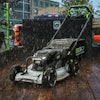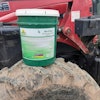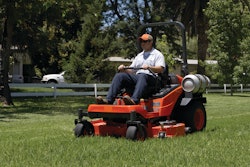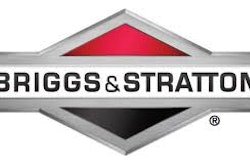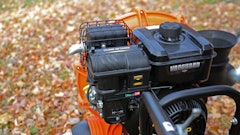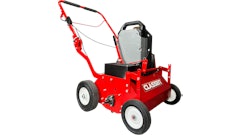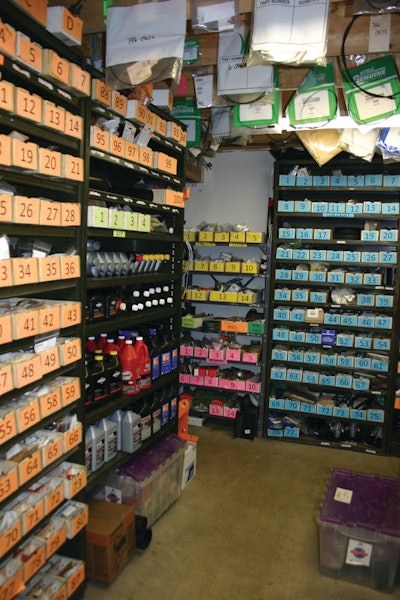
Many dealers agree that the parts department is the dealership profit center. Properly training parts department staff to manage inventories and work with customers could help increase your profits further, as well as customer loyalty.
“The parts department is the toughest and most important job in the building,” says David Pike of Pike Lawn and Garden in Brandenburg, KY. “The profits from the parts department pay the mortgage and keep you going.”
Finding the right person for the job isn’t always easy. Providing the right training will help improve the experience of parts department customers as staff grow their knowledge.
“It's not always an easy position to fill,” says Rick Thelen, parts manager at Otto Paap, a power equipment dealership in Franksville, WI, with a large online parts sales presence. “We carry a lot of lines and it takes years to gain the knowledge.”
Background and characteristics
There are some characteristics you can look for when hiring a new parts employee. The right background and qualities will help the new hire start out strong and grow to be a knowledgeable member of the parts staff as well as a guiding light to the customer. Past work in sales or in the parts department of an automobile dealership is a plus.
“They need to have good communication skills and be able to speak to the customers and understand what the customer is telling them,” says Thelen. “Computer experience and attention to detail are also important so they aren’t overwhelmed when looking up parts.”
While the business management system used to manage the parts department inventory and orders is very helpful, the employee’s experience needs to go beyond computers and involve customer service and the ability to have a fruitful dialogue with customers.
“Even with good computer systems there is so much you have to know,” explains Pike. “Customers come in with half enough information. It’s not always as easy as looking in the computer for the answer. There are questions you need to know to ask customers.”
Early on-the-job training
When new parts employees start out, a good way to ease them into the position is by having them spend a few days shadowing established employees to learn parts locations and exactly how the system works. After time working side-by-side with someone more experienced, the new hire will soon feel confident enough to go out on their own.
At Otto Paap, new parts employees help out when a parts order comes in. Employees receive the order from the supplier, and stock the parts to see where they go as a way of helping them to understand each element of the system. They also have additional training for how to handle their large online parts sales business. Employees learn how to enter new customer data into the system, pack parts, fill out shipping orders, apply labels and provide quality customer service to the online customers.
“You have to pack the parts in such a manner that they can ship across the country,” explains Thelen. “Packaging presentation has a lot to do with getting repeat customers.”
Customer service is essential
Another way they keep those online customers coming back is by stressing the importance of quality parts service not just in-store, but also over the phone. Many times staff will have to call a customer to discuss their order over the phone and get some clarification. A good experience over the phone further influences the customers to return for a parts purchase.
“Working in the parts department is probably 50% knowledge of the product and 50% being able to communicate with the customer,” explains Thelen. “It's nice to have a good parts inventory, but you also have to have good customer service to sell it.”
Probation period and demonstrated growth
When a new parts employee is brought on, a short probation period of 30 days should tell you if they are a good fit for the customer service-centric position. They don’t need to know the whole ropes of the parts department this quickly, but their behavior with customers should tell you how well they will grow into that position.
“You have to see continual improvement,” says Thelen. “It doesn't have to be monumental improvement, but as long as you see improvement every month, and that they are comfortable taking care of customers and looking up parts, they can stay on for a longer period.”
After a 30-day test of their conduct with customers, Thelen will give a new parts hire a year to really solidify their place in the department. That gives them the time to grow their parts knowledge and demonstrate continued improvement.
“Because of the broad base of knowledge that you have to have, their success in the position is not something you can call in a short probation period of 30 days,” explains Thelen.
Pike says it is hard to train someone to have the parts knowledge that can only be built over 20 years. To better allocate their parts staff’s knowledge and experience, he is implementing a new parts counter system.
“We are setting up our parts counter to have a checkout point where we can use less-knowledgeable people to pick parts and close sales, and also pull parts for the shop,” explains Pike. “The more-skilled staff will continuously search for the parts numbers. If you know the numbers and how the business system works, anyone can go into the storage to get it.”
Taking ownership
At Otto Paap, they have six employees pulling from the parts room at the same time, and it’s easy for things to get out of order. Thelen encourages staff to think about how not keeping the parts department organized can make their jobs more difficult. Then he pushes on-the-job accountability.
“The people who are actually pulling parts have to be responsible for what they do, because the parts manager or owner can't be everywhere all the time,” explains Thelen. “In sales, parts or service, ownership and responsibility are important. If our parts department is a mess, it doesn't make me any more efficient or the company any more profitable.”
